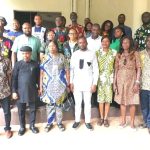The United Nations has forecasted that approximately 82 million Nigerians, about 64% of the country’s population, may experience severe food insecurity by 2030. This alarming prediction underscores the urgent need for the Nigerian government to address climate change, pest infestations, and other threats to agricultural productivity.
The warning comes amidst a steep rise in food prices across Nigeria. According to the National Bureau of Statistics, the food inflation rate hit a record high of 40.66% in May 2024, surpassing the previous month’s increase of 40.53%. This marks the highest year-on-year surge in food prices since records began in 1996.
In 2023, the Food and Agriculture Organisation (FAO) predicted that over 2.6 million Nigerians in Borno, Sokoto, and Zamfara states, as well as the Federal Capital Territory (FCT), would face a food crisis between June and August 2024. Additionally, a government-led Cadre Harmonisé analysis in March 2024 found that approximately 4.8 million people in Borno, Adamawa, and Yobe states were experiencing severe food insecurity, the highest level in seven years.
During the launch of CropWatch in Abuja, Taofiq Braimoh, representing the FAO, stressed the necessity for the Nigerian government to leverage technology to strengthen the agriculture sector and ensure food security. Braimoh highlighted the role of satellite-based crop monitoring in providing real-time data to optimize agricultural practices.
Agricultural experts, such as Tobi Awolope from the Federal University of Agriculture, Abeokuta, attribute the high hunger rate in Nigeria to climate change, which severely impacts smallholder farmers. Awolope emphasized the need for government support in subsidizing production inputs and providing technological and irrigation assistance to farmers.
The Director General of the National Space Research and Development Agency, Dr. Adepoju Mathew, highlighted the importance of science, technology, and innovation in advancing agricultural development and enhancing food security. Mathew pointed out that global food production must increase by 70% by 2050 to meet the needs of a growing population.
Farmers’ representatives, including the National Secretary of the All Farmers Association of Nigeria, Dr. Yinusu Alidu, and the President of Integrated Agricultural Services, South-West, Mr. Adeyemi Adejare, echoed the UN’s concerns. They called for proactive government measures to support irrigation farming, mechanized agriculture, and the provision of soft loans and subsidies for genuine farmers.
The UN’s report serves as a critical reminder of the challenges facing Nigeria’s agricultural sector and the urgent need for comprehensive and sustained efforts to achieve food security.




